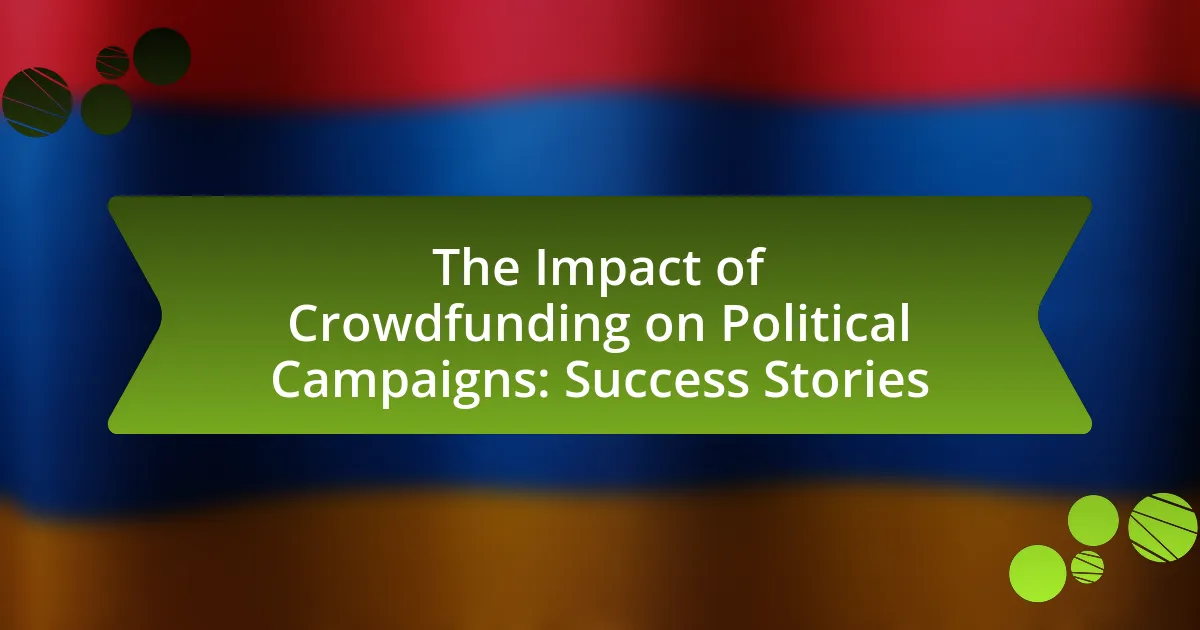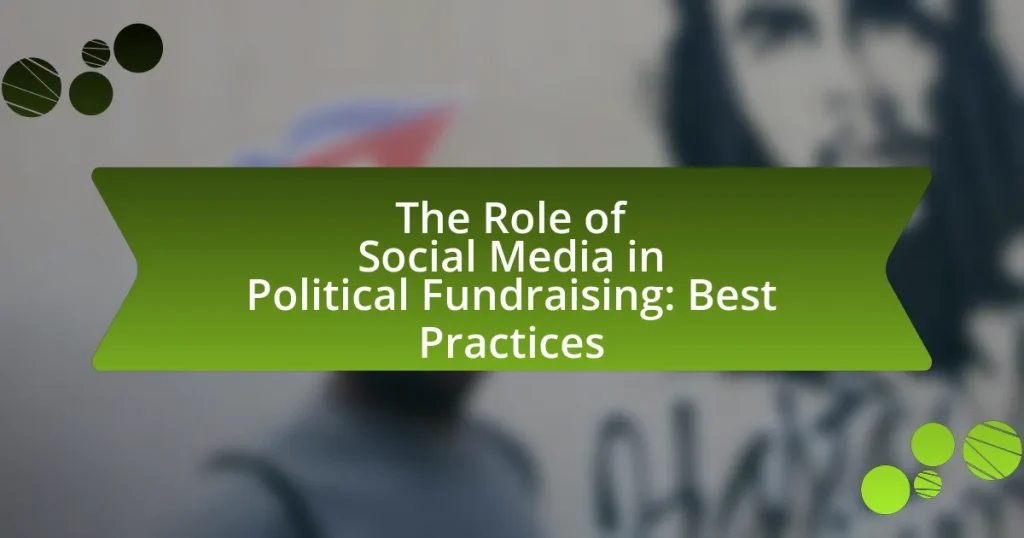The article examines the impact of crowdfunding on political campaigns, highlighting its role in democratizing fundraising and increasing candidate visibility. It discusses how crowdfunding has transformed traditional political fundraising by enabling candidates to raise small amounts from a large number of supporters, thereby fostering grassroots movements and enhancing voter engagement. Notable success stories, such as those of Bernie Sanders and Alexandria Ocasio-Cortez, illustrate the effectiveness of crowdfunding in mobilizing financial support and influencing voter perceptions. Additionally, the article addresses the challenges candidates face in crowdfunding, best practices for success, and future trends in political fundraising.
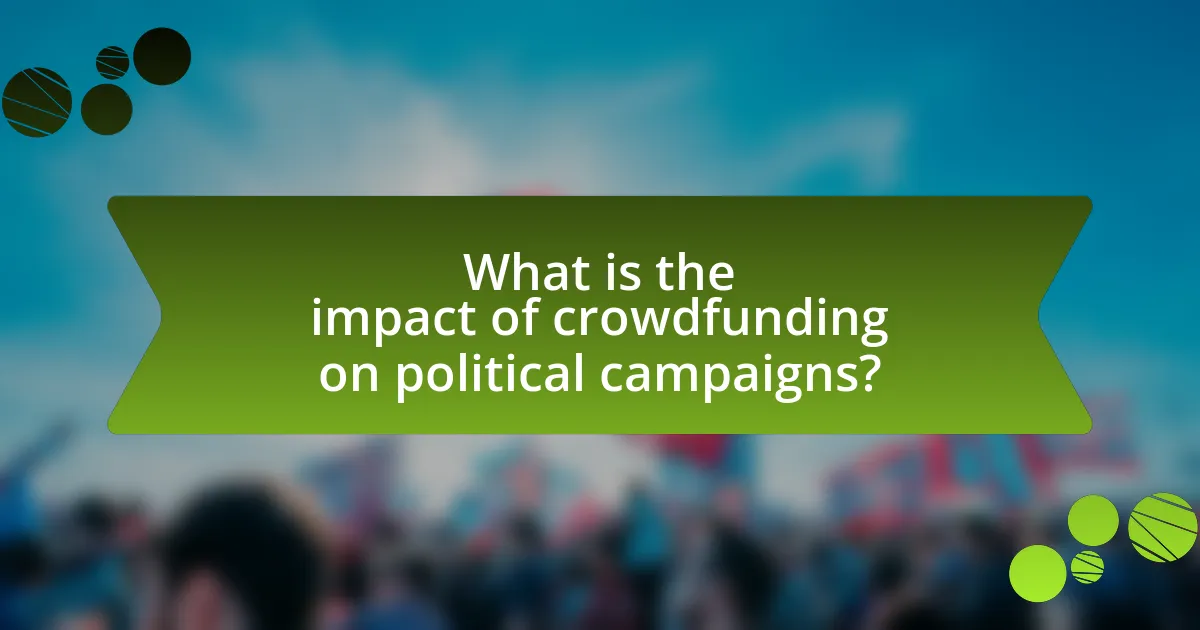
What is the impact of crowdfunding on political campaigns?
Crowdfunding significantly enhances political campaigns by democratizing fundraising and increasing candidate visibility. This method allows candidates to raise small amounts of money from a large number of supporters, which can lead to increased engagement and grassroots support. For instance, in the 2020 U.S. presidential election, candidates like Bernie Sanders raised over $25 million through small-dollar donations, showcasing the effectiveness of crowdfunding in mobilizing a broad base of financial support. Additionally, crowdfunding platforms enable candidates to reach diverse demographics, fostering inclusivity in political participation.
How has crowdfunding changed the landscape of political fundraising?
Crowdfunding has significantly transformed the landscape of political fundraising by democratizing access to campaign financing. This shift allows candidates, especially those with limited resources, to raise funds directly from a large number of small donors rather than relying solely on traditional large donors or party funding. For instance, the 2012 U.S. presidential election saw candidates like Barack Obama utilize online crowdfunding platforms, raising over $690 million from small contributions, which accounted for a substantial portion of his campaign funds. This trend has empowered grassroots movements, enabling diverse candidates to compete effectively, thereby increasing political participation and engagement among the electorate.
What are the key differences between traditional fundraising and crowdfunding?
Traditional fundraising typically involves securing large donations from a limited number of sources, such as wealthy individuals, corporations, or foundations, while crowdfunding relies on small contributions from a large number of people, often facilitated through online platforms. Traditional fundraising often requires extensive networking and personal relationships to attract major donors, whereas crowdfunding democratizes the process, allowing anyone to contribute regardless of their financial capacity. Additionally, traditional fundraising campaigns may take longer to organize and execute, while crowdfunding campaigns can be launched quickly and often have a set time frame for raising funds, creating urgency. According to a 2021 report by the Pew Research Center, crowdfunding platforms have seen significant growth, with over 50% of Americans aware of crowdfunding, highlighting its increasing relevance compared to traditional methods.
How does crowdfunding democratize political contributions?
Crowdfunding democratizes political contributions by enabling individuals from diverse socioeconomic backgrounds to participate in campaign financing. This method allows candidates to raise funds from a large number of small donors, rather than relying solely on wealthy donors or traditional funding sources, which often skew political influence towards the affluent. For instance, a study by the Pew Research Center found that 43% of Americans have contributed to a political campaign, highlighting the accessibility of crowdfunding platforms. Additionally, platforms like Kickstarter and GoFundMe have facilitated this shift, allowing candidates to reach a broader audience and engage grassroots supporters effectively. This shift not only increases the diversity of funding sources but also empowers everyday citizens to have a voice in the political process, thereby enhancing democratic participation.
Why is crowdfunding becoming a popular choice for political candidates?
Crowdfunding is becoming a popular choice for political candidates because it allows them to raise funds directly from supporters, bypassing traditional funding sources like large donors and PACs. This method democratizes campaign financing, enabling candidates to engage with a broader base of constituents. According to a 2020 study by the Pew Research Center, 43% of Americans have contributed to a political campaign, indicating a growing willingness to support candidates financially through small donations. Additionally, platforms like Kickstarter and GoFundMe have made it easier for candidates to reach potential donors, facilitating quick fundraising efforts that can significantly impact campaign viability.
What advantages does crowdfunding offer to new candidates?
Crowdfunding offers new candidates the advantage of accessing financial resources without traditional fundraising barriers. This method allows candidates to raise small amounts of money from a large number of supporters, democratizing the funding process. For instance, a study by the Pew Research Center found that 38% of Americans have contributed to a crowdfunding campaign, indicating a broad base of potential supporters. Additionally, crowdfunding platforms provide visibility and engagement, enabling candidates to connect directly with their audience, which can enhance their campaign’s reach and impact.
How does crowdfunding enhance voter engagement and support?
Crowdfunding enhances voter engagement and support by providing a platform for grassroots fundraising that connects candidates directly with their constituents. This direct financial involvement fosters a sense of ownership among voters, as they feel their contributions directly impact the campaign’s success. For instance, a study by the Pew Research Center found that campaigns utilizing crowdfunding often see increased voter turnout, as supporters are more likely to engage with candidates they have financially backed. Additionally, crowdfunding allows for diverse voices to be heard, enabling candidates from underrepresented backgrounds to gain visibility and support, thereby enriching the democratic process.
What are some notable success stories of crowdfunding in political campaigns?
One notable success story of crowdfunding in political campaigns is the 2016 campaign of Bernie Sanders, which raised over $230 million from more than 7 million individual contributions, primarily through small donations averaging around $27. This grassroots funding model demonstrated the viability of crowdfunding in politics, allowing Sanders to compete effectively against more established candidates. Another example is the 2018 campaign of Alexandria Ocasio-Cortez, who raised significant funds through online platforms, amassing over $2 million in small donations, which helped her unseat a long-serving incumbent. These cases illustrate how crowdfunding can empower candidates, enabling them to mobilize support and resources outside traditional funding channels.
Which candidates have successfully utilized crowdfunding to win elections?
Candidates such as Alexandria Ocasio-Cortez and Andrew Yang have successfully utilized crowdfunding to win elections. Alexandria Ocasio-Cortez raised over $2 million through small-dollar donations on platforms like ActBlue during her 2018 campaign, which helped her defeat a long-time incumbent. Similarly, Andrew Yang’s campaign for the 2020 Democratic presidential nomination garnered significant support through crowdfunding, raising over $40 million, primarily from individual contributions. These examples illustrate how crowdfunding can effectively mobilize grassroots support and finance political campaigns.
What strategies did successful candidates employ in their crowdfunding efforts?
Successful candidates in their crowdfunding efforts employed strategies such as building a strong online presence, leveraging social media for outreach, and engaging directly with their supporters. These strategies allowed candidates to create a compelling narrative around their campaigns, which resonated with potential donors. For instance, candidates who utilized targeted social media ads saw a significant increase in contributions, with some reporting up to a 50% rise in funding compared to traditional methods. Additionally, successful candidates often offered tiered rewards for contributions, incentivizing donations and fostering a sense of community among supporters. This approach not only increased financial backing but also enhanced voter engagement, as evidenced by campaigns that reported higher volunteer turnout and grassroots support.
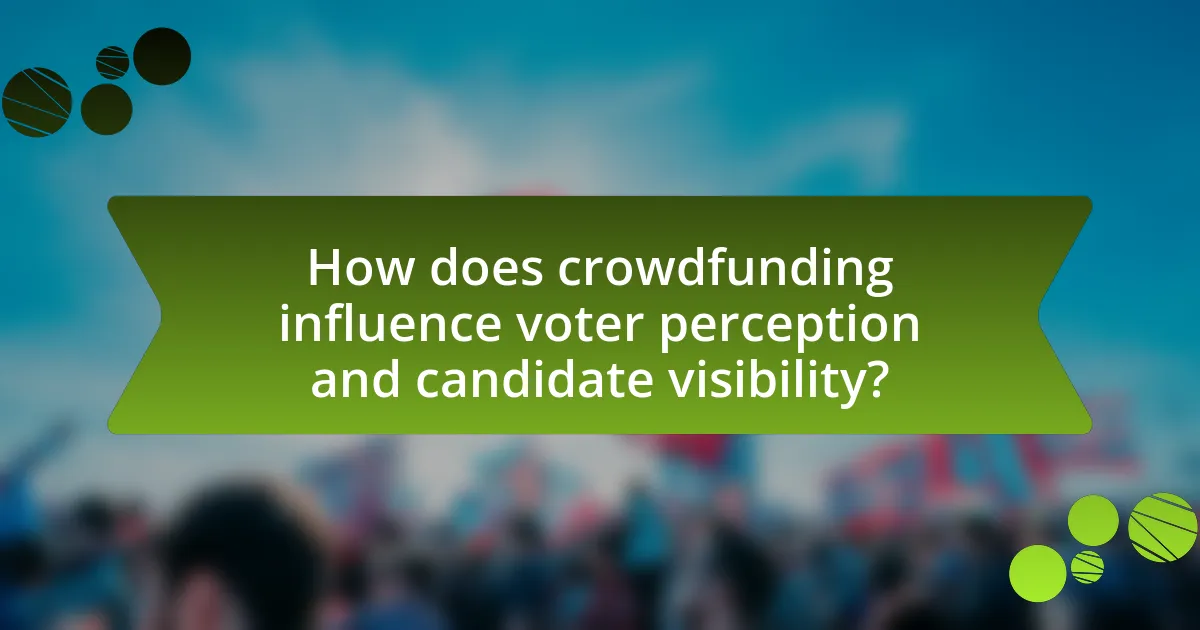
How does crowdfunding influence voter perception and candidate visibility?
Crowdfunding significantly enhances voter perception and candidate visibility by democratizing campaign financing and fostering direct engagement with constituents. This financial model allows candidates, especially those with limited resources, to reach a broader audience and showcase their platforms effectively. For instance, a study by the Pew Research Center found that candidates who utilized crowdfunding platforms were able to raise funds from a diverse group of small donors, which not only increased their financial backing but also created a sense of community support. This visibility often translates into greater media coverage and public interest, as campaigns that successfully leverage crowdfunding tend to generate buzz and attract attention, thereby influencing voter perceptions positively.
What role does social media play in crowdfunding for political campaigns?
Social media serves as a crucial platform for crowdfunding in political campaigns by facilitating direct engagement between candidates and potential donors. It allows candidates to share their messages, mobilize supporters, and create viral fundraising campaigns. For instance, the 2020 U.S. presidential election saw candidates like Bernie Sanders and Elizabeth Warren effectively use social media to raise millions in small donations, demonstrating the power of platforms like Twitter and Facebook in reaching a broad audience quickly. According to a study by the Pew Research Center, 69% of adults in the U.S. use social media, making it an essential tool for political fundraising efforts.
How can candidates leverage social media to boost their crowdfunding efforts?
Candidates can leverage social media to boost their crowdfunding efforts by creating engaging content that resonates with their target audience. This includes sharing personal stories, campaign updates, and calls to action that encourage followers to contribute financially. Research indicates that campaigns utilizing social media effectively can increase their funding by up to 30%, as platforms like Facebook and Twitter allow for direct interaction and community building. Additionally, candidates can utilize targeted advertising on these platforms to reach potential donors who align with their values, further enhancing their crowdfunding success.
What impact does social media have on the reach of crowdfunding campaigns?
Social media significantly enhances the reach of crowdfunding campaigns by facilitating broader audience engagement and increasing visibility. Platforms like Facebook, Twitter, and Instagram allow campaign creators to share their projects with a vast network, often leading to viral sharing and greater funding opportunities. For instance, a study by the University of Pennsylvania found that campaigns promoted on social media raised 30% more funds than those that were not. This demonstrates that social media not only amplifies the message but also connects creators with potential backers who may not have been reached through traditional marketing channels.
How does crowdfunding affect the overall political landscape?
Crowdfunding significantly alters the overall political landscape by democratizing campaign financing and enabling grassroots movements. This shift allows candidates with limited access to traditional funding sources to compete effectively, as evidenced by the success of campaigns like Bernie Sanders in 2016, which raised over $200 million from small donors through online platforms. Additionally, crowdfunding fosters greater voter engagement and participation, as individuals feel a direct connection to candidates they support financially. This trend has been supported by research from the Pew Research Center, which indicates that 38% of Americans have contributed to a political campaign, reflecting a growing trend towards collective funding efforts that challenge established political norms.
What changes in campaign finance laws have been influenced by crowdfunding?
Crowdfunding has led to significant changes in campaign finance laws, particularly by increasing the contribution limits for small donors and enhancing transparency requirements. The rise of online fundraising platforms has prompted lawmakers to adapt regulations, allowing candidates to raise funds from a larger pool of small contributors, which has been reflected in the increased thresholds for what constitutes a small donation. For instance, the Federal Election Commission (FEC) has recognized the impact of crowdfunding by adjusting rules to facilitate online contributions, thereby promoting greater participation in the electoral process. This shift has been supported by data showing that campaigns utilizing crowdfunding have successfully mobilized grassroots support, leading to a more diverse range of candidates entering the political arena.
How does crowdfunding contribute to the rise of grassroots movements?
Crowdfunding significantly contributes to the rise of grassroots movements by providing accessible funding sources that empower individuals and small organizations to mobilize support for their causes. This financial support enables grassroots movements to bypass traditional funding barriers, allowing them to amplify their messages and reach wider audiences. For instance, the 2016 Bernie Sanders campaign utilized crowdfunding to raise over $200 million from small donations, demonstrating how grassroots movements can leverage collective financial contributions to challenge established political structures. This model not only fosters community engagement but also enhances the visibility and viability of grassroots initiatives, ultimately leading to increased political participation and influence.
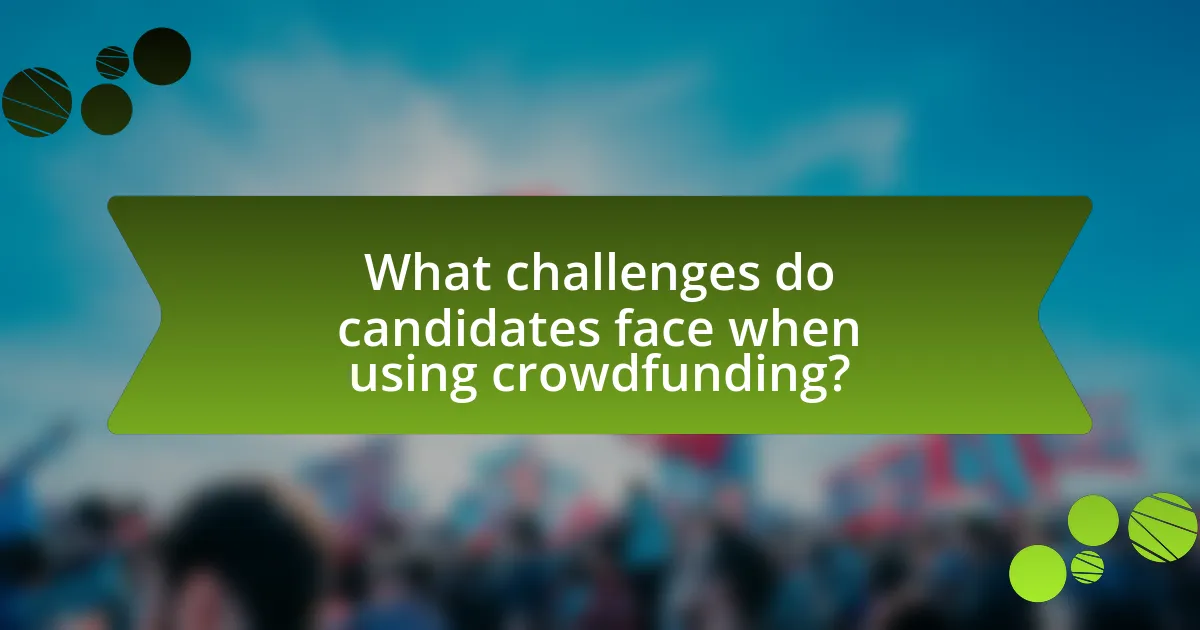
What challenges do candidates face when using crowdfunding?
Candidates face several challenges when using crowdfunding, including competition for attention, regulatory compliance, and the need for effective marketing strategies. The crowded landscape of crowdfunding platforms means that candidates must differentiate their campaigns to attract potential donors, which can be difficult given the vast number of projects vying for funding. Additionally, candidates must navigate complex regulations governing campaign financing, which vary by jurisdiction and can impose restrictions on how funds are raised and reported. Effective marketing is crucial, as candidates need to engage their audience and communicate their message clearly to encourage contributions. According to a study by the Pew Research Center, 38% of crowdfunding campaigns fail to meet their funding goals, highlighting the difficulties candidates face in successfully leveraging this fundraising method.
What are the common pitfalls in crowdfunding for political campaigns?
Common pitfalls in crowdfunding for political campaigns include lack of clear messaging, inadequate outreach, and failure to engage supporters effectively. Clear messaging is crucial; campaigns that do not articulate their goals and values struggle to attract backers. Inadequate outreach often results from limited marketing strategies, leading to a smaller donor pool. Additionally, campaigns that fail to maintain ongoing engagement with supporters miss opportunities for repeat contributions and advocacy. According to a study by the Pew Research Center, campaigns that actively communicate with their backers see a 30% increase in funding compared to those that do not.
How can candidates avoid failure in their crowdfunding campaigns?
Candidates can avoid failure in their crowdfunding campaigns by conducting thorough research on their target audience and crafting a compelling narrative that resonates with potential backers. Understanding the demographics, interests, and motivations of supporters allows candidates to tailor their messaging effectively. Additionally, setting realistic funding goals and providing clear incentives for contributions can enhance engagement. According to a study by the University of California, Berkeley, campaigns that effectively communicate their mission and impact are 50% more likely to reach their funding targets. This evidence underscores the importance of strategic planning and audience connection in successful crowdfunding efforts.
What legal considerations must candidates keep in mind when crowdfunding?
Candidates must consider compliance with campaign finance laws when crowdfunding. These laws dictate contribution limits, disclosure requirements, and the necessity of reporting contributions to the appropriate electoral authorities. For instance, the Federal Election Commission (FEC) mandates that candidates must report all contributions exceeding $200, ensuring transparency and accountability in fundraising efforts. Additionally, candidates should be aware of the regulations surrounding the use of crowdfunding platforms, as some may have specific terms of service that align with legal requirements. Failure to adhere to these legal considerations can result in penalties, including fines or disqualification from the election process.
What best practices should candidates follow for successful crowdfunding?
Candidates should focus on building a strong narrative and engaging their audience for successful crowdfunding. A compelling story that resonates with potential backers can significantly increase funding success, as evidenced by campaigns like Barack Obama’s 2008 presidential run, which raised over $750 million through grassroots contributions. Additionally, candidates should leverage social media platforms to reach a wider audience, as campaigns that effectively utilize social media can increase their funding by up to 30%. Transparency in financial reporting and regular updates to backers also foster trust and encourage continued support, which is crucial for maintaining momentum throughout the campaign.
How can candidates effectively communicate their campaign message to attract backers?
Candidates can effectively communicate their campaign message to attract backers by utilizing clear, concise messaging that resonates with their target audience. This involves identifying key issues that matter to potential supporters and articulating a compelling narrative around those issues. For instance, successful campaigns often leverage social media platforms to disseminate their message widely, engaging with backers through interactive content and personal stories that highlight their vision and values. Research indicates that campaigns that maintain consistent messaging across multiple channels see a 20% increase in engagement from potential backers, demonstrating the importance of a unified communication strategy.
What strategies can enhance donor retention in crowdfunding campaigns?
To enhance donor retention in crowdfunding campaigns, implementing personalized communication strategies is essential. Personalized communication, such as tailored thank-you messages and updates on campaign progress, fosters a sense of connection and appreciation among donors. Research indicates that campaigns that engage donors with personalized content see a 50% higher retention rate compared to those that do not. Additionally, creating a community around the campaign through social media engagement and regular updates can significantly increase donor loyalty. A study by the Nonprofit Research Collaborative found that organizations that maintain consistent communication with their donors experience a 30% increase in repeat donations.
What are the future trends of crowdfunding in political campaigns?
Future trends of crowdfunding in political campaigns include increased reliance on digital platforms, greater engagement through social media, and enhanced regulatory scrutiny. Digital platforms are evolving to facilitate micro-donations, allowing candidates to raise funds from a larger base of small contributors, which has been shown to democratize fundraising efforts. Social media engagement is expected to grow, as candidates leverage these channels to connect with voters and solicit contributions in real-time, reflecting the success of campaigns like Bernie Sanders’ 2016 presidential run, which raised significant funds through grassroots online donations. Additionally, as crowdfunding becomes more prevalent, regulatory bodies are likely to implement stricter guidelines to ensure transparency and accountability in campaign financing, as evidenced by recent discussions in various legislative bodies about the need for clearer rules governing online fundraising activities.
How might technology shape the future of crowdfunding in politics?
Technology will significantly shape the future of crowdfunding in politics by enhancing accessibility, transparency, and engagement. Digital platforms enable candidates to reach a broader audience, allowing small donors to contribute easily through mobile apps and social media. For instance, in the 2020 U.S. elections, platforms like ActBlue facilitated over $4 billion in donations, demonstrating how technology can mobilize grassroots support. Additionally, blockchain technology could provide transparent tracking of donations, increasing trust among voters. This evolution in crowdfunding will likely lead to more diverse political representation and increased participation in the democratic process.
What emerging platforms could influence political crowdfunding strategies?
Emerging platforms that could influence political crowdfunding strategies include social media networks like TikTok and decentralized finance (DeFi) platforms. TikTok’s rapid user engagement and viral content potential allow political campaigns to reach younger demographics effectively, as evidenced by the success of various political movements utilizing the platform for fundraising. DeFi platforms, on the other hand, offer innovative financial solutions that can facilitate direct peer-to-peer funding, enhancing transparency and reducing reliance on traditional financial institutions. The rise of these platforms reflects a shift towards more accessible and engaging methods of political fundraising, aligning with the increasing demand for transparency and direct voter engagement in political campaigns.
